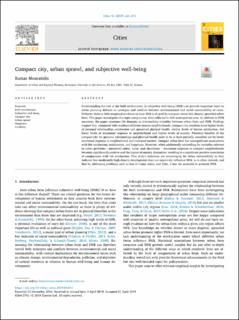| dc.description.abstract | Understanding the role of the built environment in subjective well-being (SWB) can provide important input to urban planning debates on synergies and conflicts between environmental and social sustainability of cities. Hitherto, there is little empirical evidence on how SWB is shaped by compact versus low-density sprawled urban form. This paper investigates this topic using survey data collected in Oslo metropolitan area. In addition to SWB measures, the paper examines life domains as intermediate variables between urban form and SWB. Findings suggest that, compared with residents of lower-density neighborhoods, compact-city residents have higher levels of personal relationships satisfaction and perceived physical health, similar levels of leisure satisfaction, but lower levels of emotional response to neighborhood and higher levels of anxiety. Potential benefits of the compact city for personal relationships and physical health seem to be at least partially cancelled out by lower emotional response to neighborhood and increased anxiety. Compact urban form has nonsignificant associations with life satisfaction, eudaimonia, and happiness. However, when additionally controlling for variables relevant to urban problems – perceived safety, noise, and cleanliness – emotional response to compact neighborhoods becomes significantly positive and the impact of anxiety diminishes, resulting in a significant positive association of compactness with life satisfaction. This study's outcomes are encouraging for urban sustainability as they indicate that moderately high-density development does not negatively influence SWB, as is often claimed, and that by addressing problems such as fear of crime, noise, and litter, it has the potential to promote SWB. | |
